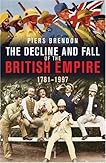 The Decline and Fall of the British Empire, 1781-1997 by Piers Brendon
The Decline and Fall of the British Empire, 1781-1997 by Piers BrendonBeing a product of the British Empire, I have something of a soft spot for it. Piers Brendon doesn’t. This massive book, which took me nearly a month to finish, has almost nothing good to say about history’s biggest-ever empire, concentrating instead on land-grabs, exploitation of peoples and resources, imperial arrogance, corruption and perfidy, military and political blunders, atrocities of various kinds, acts of cowardice and betrayal, policies of neglect and policies of divide and rule. There is, admittedly, plenty of such material to choose from. I don't believe Brendon misses any of it.
What he does miss, apart from a handful of grudging references thinly sprinkled across more than 650 closely-printed pages, is the plethora of benefits that British rule brought the colonies. British-built roads, railways, seaports and airfields were designed to facilitate colonial commerce and project imperial power, yet were of incommensurable value to the local people who also used them. British trade and colonial economic development benefited locals too, and not just the comprador classes. British-run schools and missions were designed to create docile and usefully employable imperial subjects, yet also propagated modern knowledge, helped overcome superstition and ignorance and introduced to subject peoples the selfsame liberal and humanitarian ideas that would, in time, encourage them to demand and win their freedom. If a majority of the world’s peoples today can be termed ‘civilized’ in any sense, then it is the British and their empire that deserve the lion’s share of the credit.
Brendon isn’t interested in any of that. He just goes banging on about the horrors of British rule, even when forced to admit that other empires, from that of Rome to Japan’s notorious wartime ‘Asian Co-Prosperity Sphere’, were far worse. A benign empire is, of course, a contradiction in terms; but I do believe the British tried harder than any other imperial power, and with more success, to resolve that contradiction.
It is hard to understand exactly what the author’s motivation was to research and write this book. Clearly he has an axe to grind and it cuts to the left, but this is just a smear job with no larger political conclusions drawn from it. I suppose there is a market for this kind of thing, presumably among leftist malcontents in the West. Many times I was tempted to quit reading and fling the book across the room. I persevered because of my interest in the subject; you might say I persisted for scholarly reasons.
And talking of scholarship, that in the book appears largely second-hand. Original sources are relatively few. The text is copiously annotated (there are nearly 100 pages of endnotes!) but most of the notes are just attributions of clever turns of phrase Brendon has mined from other people’s work; only rarely do they seem to offer factual support for his assertions. On the subject of my own country many of his statements are flatly wrong, leading me to believe that his scholarship regarding other parts of the erstwhile British Empire is probably just as sloppy.
Brendon also seems to have a personal grouse against Rupert Murdoch, and misses no opportunity to slander the man, the newspapers he owns, and even Murdoch's forebears. Astonishing, that he should descend to such pettiness in the midst of this Herculean literary effort.
Incidentally, and ironically, I borrowed this book from the British Council library in the capital city of the former British colony where I was born and still live. I guess it was put there by some of the aforementioned leftist malcontents; but whatever the cause, its presence on those shelves itself gives the lie to many of Brendon's slanders.





